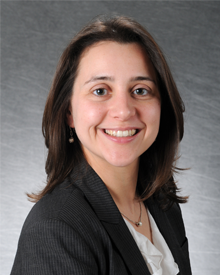
WASHINGTON (February 21, 2017) - Ahead of World Cancer Day, prominent Young Leaders from the Union for International Cancer Control (UICC) presented their vision for a new generation of cancer control access and equity in a commentary published in the latest Lancet Oncology journal. Mandi Pratt-Chapman, M.A., associate center director for patient-centered initiatives and health equity at the George Washington University (GW) Cancer Center, served as one of the authors on the commentary, which calls to bridge the gap between the achievable and the accessible in cancer care.
“Cancer care has made impressive strides, but gains are not shared equally across the globe. It is an ethical imperative to bridge the cancer divide by improving access to care and addressing obstacles to quality internationally and in our own backyard," said Pratt-Chapman.
The commentary calls for several actions from the global cancer community aimed at improving health and wellness for cancer survivors and their families, including:
- Reframing cancer care around access, equity, and social justice
- Identifying improved patient-centered measures for cancer outcomes, beyond just mortality and clinical efficacy
- Involving all stakeholders in critical decisions about cancer care
- Considering the needs of survivors as well as those needing palliative care, and addressing obstacles to receiving care
Pratt-Chapman was selected as a Young World Cancer Leader (under 40) by UICC in 2015, one of eight chosen for their impact and successful track record in cancer control and prevention. This distinction allowed Pratt-Chapman to attend the 2015 World Cancer Leaders’ Summit in Istanbul in November 2015. The 2015 Young Leaders cohort joined Young Leaders from prior years to collectively author the Lancet commentary.
The commentary continues the theme of the 2015 World Cancer Leaders’ Summit: collaboration across country borders, across diseases and through public and private partnerships. Pratt-Chapman emphasized that, “Online resources like our Cancer Control Technical Assistance Portal, our GATE community of practice and Prepared Patient bring evidence to practice sooner to help diverse communities affected by cancer."
To learn more about these resources at the GW Cancer Center, visit http://cancercenter.gwu.edu/for-health-professionals.
“Advancing access and equity: the vision of a new generation in cancer control," published in The Lancet Oncology, is available at http://www.thelancet.com/journals/lanonc/article/PIIS1470-2045(17)30041-4/abstract.
###
About the GW Cancer Center
The George Washington University (GW) Cancer Center is a collaboration between the GW Hospital, the GW Medical Faculty Associates, the GW School of Medicine and Health Sciences, and the Milken Institute School of Public Health at GW to expand GW’s efforts in the fight against cancer. The GW Cancer Center also incorporates all existing cancer-related activities at GW, serving as a platform for future cancer services and research development. Learn more about the GW Cancer Center at gwcancercenter.org.



